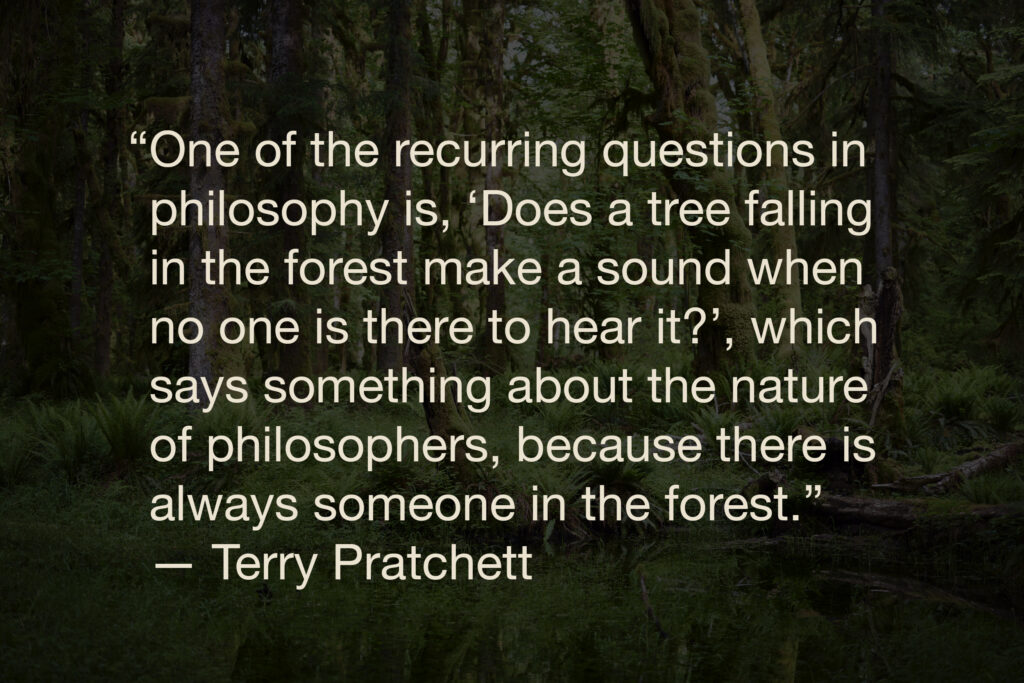
Photographs and words by Jake Eshelman,
Contributing Editor of Ecological Thinking
I Think, Therefore I Relate:
An Affirming Meander into Ecological Thinking
By Jake Eshelman
Sign up for our monthly newsletter!
O ne of the joys of having a research-creation practice is fielding questions from people who encounter my work and writing. Perhaps my favorite is the enduring, “what on Earth is ecological thinking?”. It’s a beautiful question, in my opinion, because it’s one that eludes short, clear-cut answers. Rather than a straightforward inquiry, it is a catalyst for deeper conversations and—when the stars align—maybe even a profound shift in someone’s cosmology.
In that spirit, I want to use this article to address and expand on this seemingly simple question. I’ll begin by offering a general introduction to ecological thinking as a concept before outlining a handful of the countless ways we can understand and enact its principles in our everyday lives. Naturally, this exploration doesn’t seek to capture everything ecological thinking is—or can be. That would be overly ambitious. Instead, my goal is to support your own self-study through reading, gardening, hiking, soul-searching, or however you choose to build knowledge. There’s no single path, or even direction.
So what is ecological thinking?
For one thing, it’s difficult to define—not because its principles are especially obscure or esoteric. Rather, the challenge lies in its ubiquity and inclusive nature.
Ecological thinking is everywhere if we choose to see it. But how to clarify it? A sensible, though lightly paradoxical, approach is to resist the urge to codify it as a hard-edged discipline or epistemological theory. This is the perspective offered by Lorraine Code, who has outlined complementary explanations that collectively tease out what ecological thinking does, rather than what it is. For her, ecological thinking is a practice of “imagining, crafting, articulating, [and] endeavoring to enact principles of ideal cohabitation,” borrowing heavily from what we can learn and experience when viewing the world beyond the limitations of human perceptions, beliefs, and values.1 The experience of considering the world through other-than-human perspectives naturally encourages us to fundamentally revision how we engage with our own “knowledge, subjectivity, politics, ethics, science, citizenship, and agency” among many other ideals.2
I find Code’s description particularly fruitful because it highlights some of the many complementary pathways into and forward from ecological thinking. Inspired by this and the myriad ways it can manifest, I personally enact ecological thinking as a continual invitation to (re)orientate ourselves—culturally, philosophically, and psychologically—within a dynamic network of relationships spanning the human and other-than-human world.

A great expanse
There’s no one form of ecological thinking. But to see how it can come to life, it’s worth dipping a toe into a few possibilities to see how they feel.
Realizing human potential through other-than-human interactions
Ecological thinking may be a relatively new term, but it’s far from a new idea. The principles and possibilities of ecological thinking can be recognized in Traditional Ecological Knowledge (TEK), which Patrick Curry defines as localized systems of science, philosophy, spirituality, ethics, and behavior all borne of “experience acquired over hundreds, often thousands, of years of direct contact with the natural world”.3 Put another way, TEK is an amalgamation of indigenous wisdom rooted in ecological relationships. “Artificial systems give us nice metaphors,” Calvo says. “But what we can model with artificial systems is not genuine cognition. Biological systems are doing something entirely different.”
Both TEK and ecological thinking maintain that we require intimate interactions with nature in order to be fully human—in our minds, bodies, agency, and potential. In his Native Science: Natural Law of Independence, Gregory Cajete elaborates, “only by touching the Earth can we […] recapture the feeling and understanding that we have always been a part of a living and ‘conscious’ Earth”.4 Through vision, action, and engagement with the other-than-human, ecological thinking becomes more than a ‘purely’ human process; rather, cognition is a collective endeavor nurtured by everyone in our biosphere.
The richness, possibility, and lessons of ‘thinking’ across species
One of the reasons biodiversity is the foundation for thriving ecosystems is due to the fact that different species each offer their unique perspectives and contributions. They each ‘think’ differently. Together, every being in a biosphere contributes to what Jack Hunter calls, psychodiversity, or “the measure of total diversity of thought within a system”.5 In context of ecological thinking, psychodiversity offers a treasure trove of other-than-human wisdom and worldviews that are essential for our collective flourishing. The implication here is both cooperative and pedagogical—the more we can explore other-than-human consciousness and cognition, the better equipped we are to harness new skills, solve problems, and co-create better futures.
Psychodiversity can be resolutely personal. Filmmaker and environmental activist Craig Foster offers a stimulating account of his own epistemological shift after an octopus took his camera during a dive and started filming him in return. Seeing himself from the octopus’s perspective in the resulting footage, he recounts:
in that moment, I remembered that despite all our technology, [humans] are not so different from our animal kin. Every breath of air, every drop of water, every bite of food comes from the living planet we share.6
The simple act of imagining the world from an octopus-point-of-view triggered a heightened sense of ecological awareness and belonging. By putting ourselves in other creature’s proverbial shoes, paws, tentacles, mycelia, and so on, we begin to think differently. Cognition becomes a communal process.
Situating human thought in, with, and within nature
Over the past several decades, psychologists have become increasingly receptive to abandoning the post-Enlightenment idea that the human mind is somehow isolated and independent from its ecological context.7 This is the basic premise of ecopsychology, an offshoot of normative psychology, which underscores the inextricable link between humanity’s relationship with nature and our cognition, behaviour, and mental health.8
There are several tenets that define ecopsychology, but two are particularly useful in context of ecological thinking. Firstly, ecopsychology holds that the human dissociation from nature is a root cause of mental illness. Famed psychologist Abraham Maslow puts it rather succinctly: “without the transcendent and the transpersonal, we get sick, violent, and nihilistic, or else hopeless and apathetic”.9 Secondly, ecopsychologists may also recognize a sympathetic resonance linking the human mind with ecological health.10 As the first to coin ecopsychology in 1968, Theodore Roszak draws a direct correlation between the rise and severity of mental illness with the unfolding ecological crises, quipping that “The Earth hurts, and we hurt with it”.11 For Roszak, because we are of nature, the human mind is bound by radical empathy with nature.12 In others words, ecological thinking is also something we feel.
Re: thinking
Ecological thinking is somewhat of a misnomer in that it is also a process of imagination, empathy, embodiment, and engagement. It’s much more than thought alone. After all, we cannot ‘think’ in isolation. Rather, we participate in—and through—community.
Naturally, ecological thinking can mean many things to many different people. That’s part of its power. But for me, ecological thinking is anti-anthropocentrism. It offers an antidote to human chauvinism, loneliness, and alienation. It invites us to reorient ourselves within the wider world, instead of trying to shape the world around or beneath humanity. And it is resolutely generative, offering complementary forms of knowledge-making that enrich what we’ve already learned or understood. But ultimately, it’s not within my power to define ecological thinking. It’s up to all of us. And that’s precisely the point.
About the Author
Beyond his role as the Contributing Editor of Ecological Thinking at Plantings, Jake Eshelman is a photo-based artist and visual researcher exploring the complex relationships between humans, the environment, and everyone we share it with. You can learn more about his work, writings, lectures, and publications online and via Instagram.
References
1. Code, Lorraine. Epistemic Responsibility, (Hanover, N.H.: University Press of New England, 1987), p. 24
2. Code, Epistemic Responsibility, p. 24
3. Curry, Patrick. Ecological Ethics. (Cambridge, UK: Polity Press, 2011), p. 175
4. Cajete, Gregory. Native Science: Natural Laws of Interdependence. (Santa Fe, New Mexico: Clear Light Books, 2000), p. 289
5. Hunter, Jack. Greening the Paranormal. (August Night Press, 2019), p. 39
6. Foster, Craig. ‘An Octopus Took My Camera, and the Images Changed the Way I See the World’, (New York Times, April 22, 2024) <https://www.nytimes.com/2024/04/22/opinion/earth-day-octopus-teacher.html>
7. Metzner, Ralph. Green Psychology: Transforming Our Relationship To The Earth, (Rochester, Park Street Press, 1999), p. 12
8. Roszak, Theodore. The Voice Of The Earth: An Exploration Of Ecopsychology, (New York, Touchstone, 1992), p. 14
9. Maslow, A.H. (1968). Toward A Psychology Of Being. 2nd edition. (New York: D. Van Nostrand Company, 1968), p. iv
10. Roszak, Theodore. Voice Of The Earth, p. 308
11. Ibid, p. 308
12. Roszak, The Voice Of The Earth, p. 15
Plantings
Issue 36 – June 2024

World Sensorium: Mapping the Cultural Heritage of Aromatic Plants
By Gayil Nalls

Viriditas: Musings on Magical Plants—Rosa spp
By Margaux Crump

The Boy Who Was King of Vanilla
By Elena Kazamia

Learning to Grow with The Hampton’s Pepper Professionals
By Ian Sleat

The Dual Nature of Japanese Knotweed
By Gayil Nalls

Eat More Plants Recipes:
Japanese Knotweed Sorbet
By Gayil Nalls

Plantings Print Annual 2023
Do you have the 2023 Plantings print annual?
Plantings cultivates innovative ideas and fresh perspectives, nurturing the global conservation community. Our readers find inspiration in forward-thinking individuals and approaches dedicated to fostering a better life for the planet and all its inhabitants.
The 2023 edition of Plantings is available in our store for shipping.

